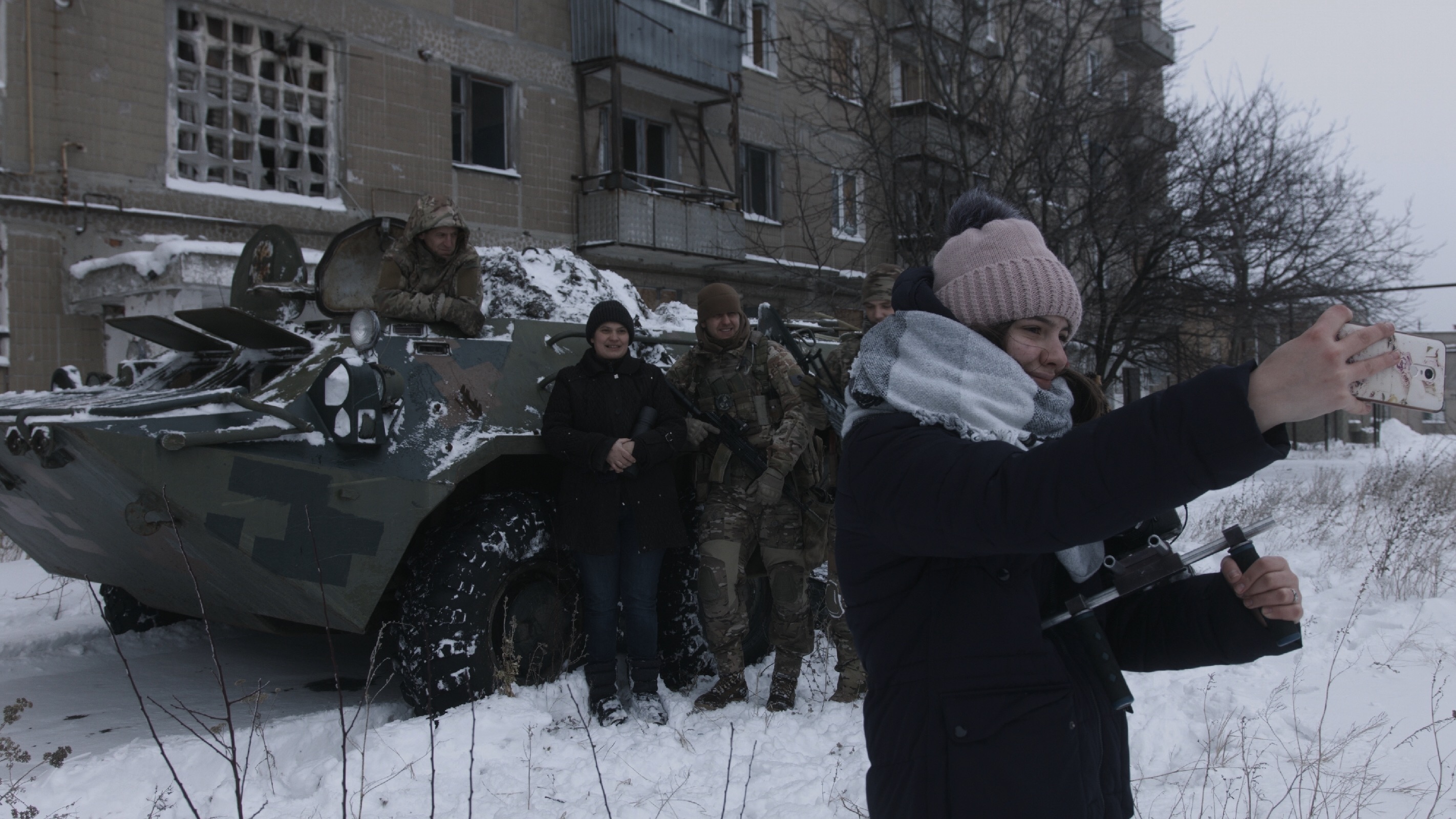Hanna Gladka, the heroine of the film “The Earth Is Blue as an Orange” was brought to Lithuania from Ukraine by the filmmakers: “I left the Motherland and I will have to live with that feeling”

One more film could be made about the journey of Hanna Gladka, the heroine of the Ukrainian-Lithuanian documentary "The Earth Is Blue as an Orange", and her five children and Hanna's sister Olga's son, Danil, from war-torn Ukraine to Lithuania.
Hanna came to Lithuania from Ukraine with her three daughters Myroslava, Anastasiia, Yaroslava, two sons Stanislav and Vladislav, and sister Olga's son Danil. The Ukrainian woman who lived in the small town of Krasnohorivka near Donbas quickly decided to evacuate this time, she says, because she did not want to deprive another of her children, the little Yaroslava, of her childhood. Indeed, all her children saw only war while growing up, they grew up without playgrounds, and spent most of their time in the basement or in a small corridor, where they were hiding from shelling.
Last week, Hanna and her family had to come to Lithuania to present the documentary film "The Earth Is Blue as an Orange" by Ukrainian director Iryna Tsilyk. When unrest started near Donbas, producers of the film tried to get Hanna and her children to move to a safer place and wait in Kiev until the departure documents of one of the boys for the trip to Lithuania were prepared. However, the family enjoyed peace for only a few days – the war broke out all over Ukraine.
Giedrė Žickytė, the producer of the film who organized the evacuation of the family to Lithuania, says that everyone who could contributed, especially the Lithuanian Embassy in Ukraine. "We are extremely grateful to the Lithuanian ambassador to Ukraine, Valdemaras Sarapinas, and Lithuanian officials, who did everything possible and impossible at this stressful time to ensure that the family was safely brought to Poland. "Every time I think about it, I can't hold back my tears. You saved our whole family from destruction," Hanna thanked the Lithuanian ambassador to Ukraine by phone.
At the press conference, she emotionally talks about how stations in Ukrainian cities look like these days – lots of crying children, women, elderly people. "That suffering is unbearable," the mother of five children spoke emotionally. The trains are overcrowded, she and her children had to squeeze together with ten other people in seats normally reserved for six passengers.
The family of the event organizer Agnė Grigaliūnienė offered shelter to the family of the heroine of the film "The Earth Is Blue as an Orange" as she came to Lithuania. Agnė gathered a huge group of people who made sure that the family, who arrived with small bags and backpacks, had something to wear, – "Apranga” [clothing retail chain] collected some clothes, "Lidl" shopping centre provided coupons for food, "Tele 2" telecommunications company provided mobile internet, they received mobile phones from "Tele 2" and "Red Cross" campaign, during which Lithuanian people bring and give away their phones, thus giving Ukrainians the opportunity to stay in touch with their loved ones in the war-torn country. Medics are preparing to help Hanna's family – the clinic "Pagalba mažyliui" ("Help for the Little One"), and even several dentists, the family was invited to lunch after the press conference by the restaurant "St. Valentino".
The film "The Earth Is Blue as an Orange" produced by the well-known Lithuanian film director Giedrė Žickytė is now more relevant than ever. Light and hope are alive in it as well as Hanna's love for Ukraine. The creative process in the film reveals the power and magic of art in the face of disaster. All the income collected for the tickets will be used for the start of a new life for Hanna and her children and for the remaining members of the film crew in Ukraine.
In her film "The Earth Is Blue as an Orange", Ukrainian director Iryna Tsilyk tells the story of a family living in Krasnohorivka, Donbas. At the time when there is chaos all around and the years-long war is felt at every step, Hanna, a single mother of four children, creates a zone of light, safety and creativity for her children in her home. A film within the film, and the creative process unfolding in the poor war-weary everyday life reveals the power and magic of art in the face of catastrophe. For the mother and her four children, transforming trauma into creation is the only way to remain human.
Having debuted at the prestigious Sundance film festival in the USA and won the best director prize in the documentary film category, started its journey in Europe at the Berlin Film Festival, presented to the New York audience at the MoMa Museum of Modern Art, toured 70 international festivals, and won more than twenty international awards, joint work by Ukrainian and Lithuanian creators, the documentary film "The Earth is Blue as an Orange" is now shown in Lithuanian cinemas. All the funds collected for the tickets will be transferred to the family of Hanna, the heroine who is the victim of the war, and to the film crew remaining in Ukraine.
Together with the Ukrainian director Iryna Tsilyk, the Lithuanian crew was also involved in the making of the film – sound director Jonas Maksvytis, colourist Jonas Sunklodas and Madstone studio, editor Danielius Kokanauskis. Documentary filmmaker Giedrė Žickytė became the producer of the film. The film was produced by Albatros Communicos (Ukraine) and Moonmakers (Lithuania).
Production of the film "The Earth Is Blue as an Orange" was partially supported by the Lithuanian Film Centre, Ukrainian State Film Agency, IDFA Bertha Fund together with the Creative Europe MEDIA program. Sponsors of the film distribution in cinemas are IDFA Bertha Fund Europe, Lithuanian Cinema Centre, JCDecaux Lietuva.